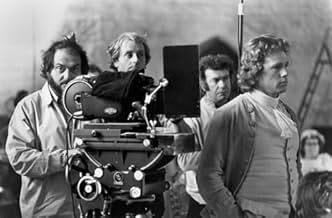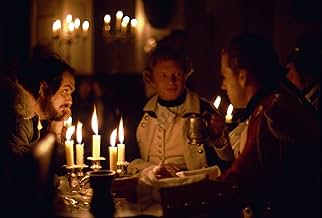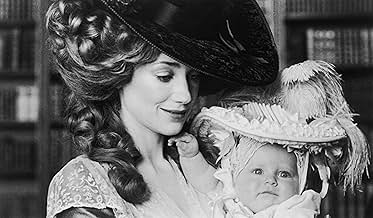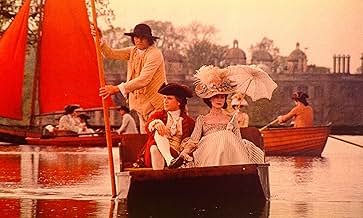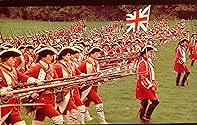Im England des 18. Jahrhunderts gewinnt ein irischer Schurke das Herz einer reichen Witwe und übernimmt die aristokratische Stellung ihres verstorbenen Ehemanns.Im England des 18. Jahrhunderts gewinnt ein irischer Schurke das Herz einer reichen Witwe und übernimmt die aristokratische Stellung ihres verstorbenen Ehemanns.Im England des 18. Jahrhunderts gewinnt ein irischer Schurke das Herz einer reichen Witwe und übernimmt die aristokratische Stellung ihres verstorbenen Ehemanns.
- Regie
- Drehbuch
- Hauptbesetzung
- 4 Oscars gewonnen
- 17 Gewinne & 14 Nominierungen insgesamt
Hardy Krüger
- Capt. Potzdorf
- (as Hardy Kruger)
Diana Körner
- Lischen - German Girl
- (as Diana Koerner)
André Morell
- Lord Gustavus Adolphus Wendover
- (as Andre Morell)
Zusammenfassung
Reviewers say 'Barry Lyndon' is acclaimed for its breathtaking cinematography, intricate period details, and masterful use of natural light, often likened to fine art. It explores themes of human folly, the quest for wealth and status, and the resulting downfall. However, some criticize its slow pace, the perceived lack of emotional depth in characters, especially Ryan O'Neal's performance, and its lengthy runtime. Despite these drawbacks, many regard it as a significant artistic achievement and a standout in Kubrick's oeuvre.
Empfohlene Bewertungen
The beauty, the depth, and the mystery of this film are unsurpassable - what Kubrick was doing with light is just a miracle. Special lenses were designed to shoot interiors and exteriors in natural light. In one scene Barry (Ryan O'Neil) was having a dinner with a German woman who was feeding her baby and the candle light made the whole scene look like a Caravaggio's painting. This is just one of many scenes. Each of them is perfection and harmony. Costumes and sets were crafted in the era's design. Age of Enlightenment with its gallantry, wars, and duels, had been recreated in the film with the precision of the celebrated landscape and portrait masters of the period such as Thomas Gainsborough; Sir Joshua Reynolds, founder of the Royal Academy of Arts; George Romney to name just a few. If nothing else, watching BL is pure aesthetic delight - and there is one man who responsible for it, Stanley Kubrick. If ever divine film was made, "Barry Lyndon" was it and Kubrick could've quoted the Bible - "God looked at everything he had made, and he found it very good".
I've read the comments and articles that call "Barry Lyndon" cold, slow, boring, "the collection of pretty pictures', "flawed" masterpiece, and the most ridiculous one, "glittering ornament with a hollow center". I simply can't understand it. "Barry Lyndon" is the most compelling and compassionate realization of the inevitable finality of everything in this world which was presented by the visionary director with elegant sensual melancholy. Stanley Kubrick known for his detached, seemingly remote and non-sentimental style chose to reach out to his viewer directly during the epilogue, "It was in the reign of George III that the aforesaid personalities lived and quarreled, good or bad, handsome or ugly, rich or poor, they are all equal now". I don't recall any other movie that would illustrate the old wisdom, "everything will pass" in such sublime and deeply moving way.
I've read the comments and articles that call "Barry Lyndon" cold, slow, boring, "the collection of pretty pictures', "flawed" masterpiece, and the most ridiculous one, "glittering ornament with a hollow center". I simply can't understand it. "Barry Lyndon" is the most compelling and compassionate realization of the inevitable finality of everything in this world which was presented by the visionary director with elegant sensual melancholy. Stanley Kubrick known for his detached, seemingly remote and non-sentimental style chose to reach out to his viewer directly during the epilogue, "It was in the reign of George III that the aforesaid personalities lived and quarreled, good or bad, handsome or ugly, rich or poor, they are all equal now". I don't recall any other movie that would illustrate the old wisdom, "everything will pass" in such sublime and deeply moving way.
Martin Scorcese reportedly considers this to be Kubrick's best film. I must agree, and I would say it's his best by some fair margin. I've never seen a film with photography that even begins to approach that in Barry Lyndon. But everyone mentions the photography. The three things that most decisively set this film apart from all of Kubrick's others and really haven't been mentioned enough are its enormous heart, its uncompromising spirit, and the way it seems to suspend time over and over again, simultaneously standing still yet flowing along easily, almost breathlessly. If you watch it expecting A Clockwork Orange or The Shining, you'll be very disappointed and may end up calling it long and boring, but if you set aside an entire evening and surrender yourself totally to its magic, I swear you'll be looking for yourself in Stunland a few hours later. I's time to treat yourself to Barry Lyndon. You may be shocked at discovering what's been there for so long.
Some movies - I wish there were more of them - simply look like a series of great paintings. This film has that look. You could freeze-frame many of the scenes and swear you were looking at a Gainsborough, a Vermeer, a Hogarth or similar work of art by one the great artists of three to five centuries ago. It's just beautiful.
For that, we have Director Stanley Kubrick and Photographer John Alcott to thank. Being a three-hour movie, there are plenty of wonderful shots to admire, too. In addition, the costumes are lavish and authentic and the scoring is notable. It's no accident that Oscars were garnered for art/set direction, cinematography, costume design and scoring. Yeah, if you enjoy classical music, you'll really enjoy the soundtrack, too, under the guidance of conductor Leonard Roseman.
Not to be overlooked is the fine acting and the interesting and underrated story. I say "underrated" because this film, from what I've read, bored a lot of people and and it was a box-office flop. That's too bad because, frankly, I found the story (outside of the first 10--15 minutes) to be fascinating. As I watched, I kept wondering what strange occurrences will happen next to the lead character, "Redmond Barry/Barry Lyndon," played beautifully by Ryan O'Neal. (For most of the movie, he's called "Redmond Barry," so I will refer to him as that.)
Overall, this was a low-key adventure story about the rise-and-fall of a "scoundrel" back in late 18th century Englishman. "Mr. Barry" is an Irishmen living in England who winds up dealing with a number of people: Irish, English, Prussian, French. His dealings with these people are bizarre at times. While he mainly is shown doing what he can to promote himself, for either monetary gain and prestige of a name and power, he's not all bad. There is a compassionate side to him, but it only shows itself in small doses. It makes him all the more interesting to watch, because you don't always know how he's going to react to his circumstances, which change radically every few years.
We witness his rise to prominence and then his fall when his "sins begin to find him out," as the Bible would describe. It's quite a roller coaster ride.
This is an emotional, involving story, and a feast for the eyes and ears. It's quite different, too, certainly not the average fare from Kubrick. I can only hope this comes out on a high-definition disc some day. Admirers of this film need to see this in all its glory.
For that, we have Director Stanley Kubrick and Photographer John Alcott to thank. Being a three-hour movie, there are plenty of wonderful shots to admire, too. In addition, the costumes are lavish and authentic and the scoring is notable. It's no accident that Oscars were garnered for art/set direction, cinematography, costume design and scoring. Yeah, if you enjoy classical music, you'll really enjoy the soundtrack, too, under the guidance of conductor Leonard Roseman.
Not to be overlooked is the fine acting and the interesting and underrated story. I say "underrated" because this film, from what I've read, bored a lot of people and and it was a box-office flop. That's too bad because, frankly, I found the story (outside of the first 10--15 minutes) to be fascinating. As I watched, I kept wondering what strange occurrences will happen next to the lead character, "Redmond Barry/Barry Lyndon," played beautifully by Ryan O'Neal. (For most of the movie, he's called "Redmond Barry," so I will refer to him as that.)
Overall, this was a low-key adventure story about the rise-and-fall of a "scoundrel" back in late 18th century Englishman. "Mr. Barry" is an Irishmen living in England who winds up dealing with a number of people: Irish, English, Prussian, French. His dealings with these people are bizarre at times. While he mainly is shown doing what he can to promote himself, for either monetary gain and prestige of a name and power, he's not all bad. There is a compassionate side to him, but it only shows itself in small doses. It makes him all the more interesting to watch, because you don't always know how he's going to react to his circumstances, which change radically every few years.
We witness his rise to prominence and then his fall when his "sins begin to find him out," as the Bible would describe. It's quite a roller coaster ride.
This is an emotional, involving story, and a feast for the eyes and ears. It's quite different, too, certainly not the average fare from Kubrick. I can only hope this comes out on a high-definition disc some day. Admirers of this film need to see this in all its glory.
In terms of story this is on the surface at least, the simplest thing Kubrick ever made. However in terms of the technical aspect, it must have been one of his most challenging. The plot is basically about how greed, arrogance and ignorance can easily become the ruin of a man. The story itself is well told, but mostly quite simple as I said. The humor keeps us interested in the story, as does its undeniable visual beauty. It is not a stretch to say that this must be among the most beautiful looking films ever made. Every scene is filmed in all natural light, whether it be by sun or fire, and the landscapes and architecture handpicked by Kubrick himself are amazing. As in all Kubrick films, so much attention to small details equates to a great result in the end. Spielberg himself has called this film "possibly the most beautifully shot film in history.".
In terms of story, it's entertaining, in terms of it's technical achievement, the film is a landmark. Even for all the story's simplicity, there is a startling statement in the film that certainly can give the viewer real pause and thought. The finality of this world, the equality of all things in the end. It is certainly an interesting, powerful and very humbling down to earth observation. It is the kind of worldly observation that could perhaps lead some people to ruin, and yet lead others to strive for perfection. Perhaps that is part of Kubrick's thinking here, a Kubrickian challenge if you will, as he certainly was always an artist that was challenging his viewers. That through this observation people may become more aware of what they're leaving behind in this world...as one day, we will all equally be gone. For all the things written about this film, it is probably not nearly as unimportant of a story as many critics have said of it. Then again, critics and moviegoers alike have long been trying to catch up to Stanley, and never the other way around. 8.5/10.
In terms of story, it's entertaining, in terms of it's technical achievement, the film is a landmark. Even for all the story's simplicity, there is a startling statement in the film that certainly can give the viewer real pause and thought. The finality of this world, the equality of all things in the end. It is certainly an interesting, powerful and very humbling down to earth observation. It is the kind of worldly observation that could perhaps lead some people to ruin, and yet lead others to strive for perfection. Perhaps that is part of Kubrick's thinking here, a Kubrickian challenge if you will, as he certainly was always an artist that was challenging his viewers. That through this observation people may become more aware of what they're leaving behind in this world...as one day, we will all equally be gone. For all the things written about this film, it is probably not nearly as unimportant of a story as many critics have said of it. Then again, critics and moviegoers alike have long been trying to catch up to Stanley, and never the other way around. 8.5/10.
Kubrick's adaptation of Thackeray's Barry Lyndon sharply divides fans of the great director's work, as the languid pace and seemingly interminable running time -- not to mention Ryan O'Neal's questionable performance in the title role -- are cherished by some and deplored by others. Little argument will be made against John Alcott's Academy Award-winning cinematography or Ken Adam's production design, however, and Kubrickian motifs are manifest in the gallery of characters' wide-ranging displays of cowardice, guile, duplicity, avarice, jealousy, greed, and cruelty. Marisa Berenson is terribly short-changed in her role as the Lady Lyndon, but a number of other performers are given the opportunity to create a handful of memorable moments -- especially Arthur O'Sullivan (albeit briefly) as the charming, intelligent highwayman and Patrick Magee as the Chevalier. Love it or hate it, Barry Lyndon will remain essential viewing for aficionados of the director, who enjoys taking his usual shots at the more discouraging aspects of human behavior.
Wusstest du schon
- WissenswertesProduction was moved from Ireland to England after writer, producer, and director Stanley Kubrick received word that his name was on an I.R.A. hit list for directing a movie featuring English soldiers in Ireland. Consequently, several scenes were dropped.
- PatzerThe narrator states, early on, "About this time, the United Kingdom was in a state of great excitement". The United Kingdom came into being in 1801, when it merged with the Kingdom of Ireland, before which it was known merely as the Kingdom of Great Britain. In fact the Act of Union of 1707, which joined England and Scotland, refers to "the United Kingdom of Great Britain" or "the United Kingdom" throughout the text. "United Kingdom" was in common use at the time of the film.
- Zitate
Title card: [End title card] EPILOGUE
Title card: It was in the reign of George III that the aforesaid personages lived and quarreled; good or bad, handsome or ugly, rich or poor they are all equal now
- Alternative VersionenThe 2011 Blu-ray plastered the opening Saul Bass variant of the Warner Bros. Pictures logo with the black and white WB shield.
- VerbindungenEdited into Hai-Kubrick (1999)
- SoundtracksPiano Trio in E-flat, Op 100 (second movement)
Composed by Franz Schubert
piano: Anthony Goldstone
cello: Moray Welsh
violin: Ralph Holmes
Top-Auswahl
Melde dich zum Bewerten an und greife auf die Watchlist für personalisierte Empfehlungen zu.
Details
- Erscheinungsdatum
- Herkunftsländer
- Sprachen
- Auch bekannt als
- Баррі Ліндон
- Drehorte
- Produktionsfirmen
- Weitere beteiligte Unternehmen bei IMDbPro anzeigen
Box Office
- Budget
- 11.000.000 $ (geschätzt)
- Weltweiter Bruttoertrag
- 284.426 $
- Laufzeit3 Stunden 5 Minuten
- Farbe
- Sound-Mix
- Seitenverhältnis
- 1.66 : 1
Zu dieser Seite beitragen
Bearbeitung vorschlagen oder fehlenden Inhalt hinzufügen





